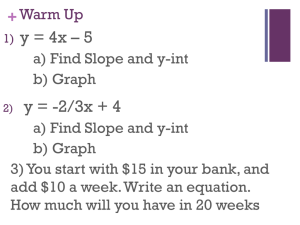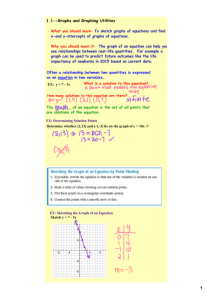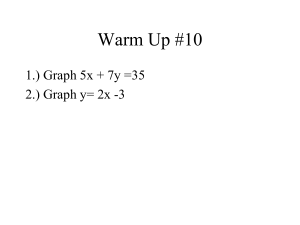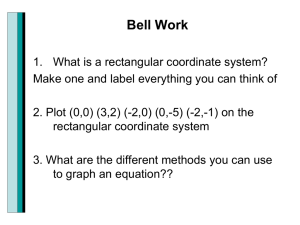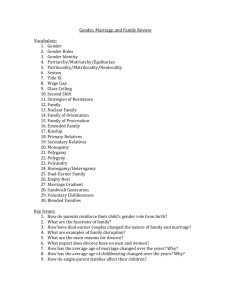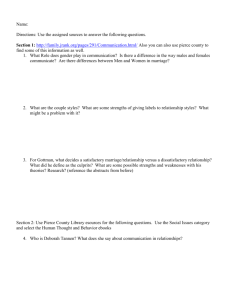File
advertisement
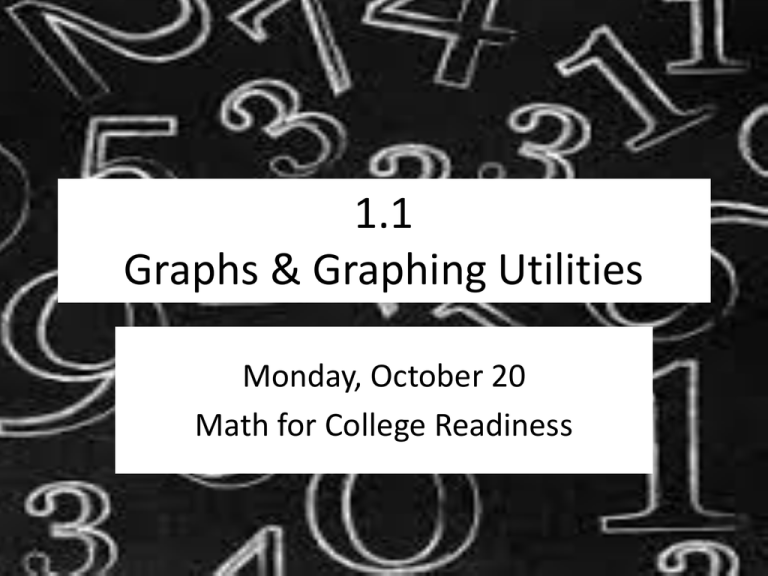
1.1 Graphs & Graphing Utilities Monday, October 20 Math for College Readiness Rectangular Coordinate System Coordinate Grid: a grid formed by two perpendicular number lines called axes. (2, 3): The number 3 x-axis: the horizontal axis on the coordinate plane y-axis: the vertical axis on the coordinate plane (2, 3) x-coordinate: The first number in an ordered pair, which tells the distance to move right or left from (0, 0) Ordered Pair: a pair of numbers used to locate a point on a coordinate grid y-coordinate: The second number in an ordered pair, which tells the distance to move up or down from (0, 0) (2, 3): The number 2 Plot the following points: 1. (0, 10) 2. (-2, 3) 3. (-10, 3) 4. (-4, -2) 5. (-7, -10) 6. (0, -5) 7. (7, -10) 8. (4, -2) 9. (10, 3) 10. (2, 3) Graphing an Equation: Point-Plotting Method 𝑥 -3 -2 -1 0 1 2 3 𝑦 = 4 − 𝑥2 (𝑥, 𝑦) Graphing an Equation: Point-Plotting Method 𝑥 -3 -2 -1 0 1 2 3 𝑦 = 𝑥 −3 (𝑥, 𝑦) 1.1 Graphs & Graphing Utilities Tuesday, October 21 Math for College Readiness Identify the 𝑥- and 𝑦- intercepts. Identify the 𝑥- and 𝑦- intercepts. Identify the 𝑥- and 𝑦- intercepts. Identifying Intercepts No 𝑥- intercept 1 𝑦- intercept Identifying Intercepts No 𝑥- intercept No 𝑦- intercept Identifying Intercepts 3 𝑥- intercepts 1 𝑦- intercept Identifying Intercepts 1 𝑥- intercept No 𝑦- intercept Interpreting Data from Graphs Please open your textbook to page 96. Interpreting Data from Graphs Here are two mathematical models that approximate the data displayed by the line graphs: Wife is under 18 at time of marriage: 𝑑 = 4𝑛 + 5 Wife is over 25 at time of marriage: 𝑑 = 2.3𝑛 + 1.4 Where 𝑛 is the number of years after marriage and 𝑑 is the percentage of marriages ending in divorce. Interpreting Data from Graphs a) Use the appropriate formula to determine the percentage of marriages ending in divorce after 10 years when the wife is over 25 at the time of the marriage. Recall: 𝑑 = 2.3𝑛 + 1.5 Observe: 𝑛 = 10 We have: 𝑑 = 2.3 10 + 1.5 = 23 + 1.5 = 24.5 Finally, the model indicates that 24.5% of marriages end in divorce after 10 years of marriage when the wife is over the age of 25 at the time of the marriage. Interpreting Data from Graphs b) Use the appropriate line graph in Figure 1.11 to determine the percentage of marriages ending in divorce after 10 years when the wife is over 25 at the time of the marriage. Observe: The line graph on page 96 of the textbook. Locate 10 on the horizontal axis and locate the point above 10. Read across to the corresponding percent on the vertical axis. Finally, the graph indicates that 25% of marriages end in divorce after 10 years of marriage when the wife is over the age of 25 at the time of the marriage. Interpreting Data from Graphs c) Does the value given by the mathematical model underestimate or overestimate the actual percentage of marriages ending in divorce after 10 years when the wife is over the age of 25 as shown by the graph? By how much? Recall from Part a): model indicated 24.5% Recall from Part b): graph indicated 25% So, 24.5% is slightly less than 25%. The difference between these percentages is 25% − 24.5% = 0.5%. This means that the mathematical model underestimated the actual percentage by 0.5%, providing a fairly accurate description of the data. Review Wednesday, October 22 Math for College Readiness I Do, You Do, We Check Work in a group of 3 to complete the activity on Section 1.1. The Procedure: Both partners will work on the problem. Once both partners believe they have the final answer, check to see if your answers are the same. If the answers match, you may move on to the next problem. If the answers do not match, look over each other’s work and try to find the error. Once you have completed two problems, raise your hand and I will come check them. If all 2 problems are correct, you may move onto the next set of problems. If any of your problems are incorrect, you must try them again and I will come check when you think you have corrected your mistake. I Do, You Do, We Check Review Quiz: 1.1 Thursday, October 23 Math for College Readiness
